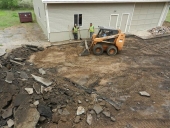
 5
5




 4
4




sow…reap…compost…repeat
 3
3




 1
1




Weeds are just plants with enough surplus will to live to withstand normal levels of gardening!--Alexandra Petri
 4
4





 4
4




Gray Henon wrote:Vacant does not necessarily mean abandoned. Be sure to make every effort to contact the owner to ask for permission. Use GIS services, tax records, google, whatever you can. If you do get a hold of the owner and they are agreeable, a long term dollar (or more) lease would be ideal. There may be abandonded property laws on the books, but if you choose to operate under one of these laws be absolutely sure you have a right to the property. If you choose to go guerrilla, be aware the owner could show up at any time and charge you with trespassing, vandalism, and block your access to the soil and perennials you have carefully cared for over years.
There are several accounts of people building wondrous gardens on “abandoned” private and public property, just to be kicked off when the owner decides they don’t want them there for whatever reason. Don’t make that mistake.
 4
4




 4
4




Nicholas said, " There is a lot near my home which used to be a school I went to, until 5 years ago when it was all demolished and torn up, and has since been vacant and quite overgrown with foliage.
Invasive plants are Earth's way of insisting we notice her medicines. Stephen Herrod Buhner
Everyone learns what works by learning what doesn't work. Stephen Herrod Buhner
 2
2




Anne Miller wrote:Check with the city to see if they require a license or a charter.
 2
2




Phillip Moore
 1
1




 1
1




"How fleeting are all human passions compared with the massive continuity of ducks.“ — Dorothy L. Sayers

| I agree. Here's the link: http://stoves2.com |




